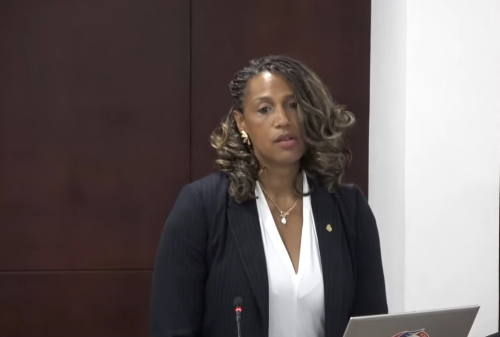 PHILIPSBURG:--- Minister of Tourism, Economic Affairs, Transport, and Telecommunication (TEATT), Grisha Heyliger-Marten, on Monday responded to questions from Members of Parliament regarding the issuance of a casino license to Port de Plaisance. Her comprehensive replies highlighted the regulatory framework, legal basis for the license approval, compliance with policy requirements, and the ministry’s commitment to upholding transparency in the gaming sector.
PHILIPSBURG:--- Minister of Tourism, Economic Affairs, Transport, and Telecommunication (TEATT), Grisha Heyliger-Marten, on Monday responded to questions from Members of Parliament regarding the issuance of a casino license to Port de Plaisance. Her comprehensive replies highlighted the regulatory framework, legal basis for the license approval, compliance with policy requirements, and the ministry’s commitment to upholding transparency in the gaming sector.
Legal Basis for the Casino License Approval
Minister Heyliger-Marten explained that the decision to issue a casino license to Port de Plaisance complied fully with the “Game of Chance Policy” and relevant legal requirements. The issuance was based on a positive recommendation following thorough due diligence by the departments responsible.
The minister emphasized the importance of the “principle of trust” in governance, noting that promises or commitments made by government officials carry significant weight when supported by policy and law. While there are cases where this principle may supersede strict legal conditions, Heyliger-Marten clarified that all applicable requirements were met in this instance, removing the need to rely on any exceptional governance principles.
Room Count and Compliance with Casino Policy
Questions from Members of Parliament also addressed room count requirements in the context of the Port de Plaisance license. Minister Heyliger-Marten confirmed that the property’s room inventory, which combines accommodation across multiple buildings, met compliance thresholds outlined in the casino policy.
Further, the minister reiterated that license holders are given a two-year window to meet additional requirements, such as expanding their room inventory to the mandated 200 rooms. While fairness in enforcing regulations remains a priority, Heyliger-Marten emphasized that failure to meet these conditions without substantiated justification could lead to revocation of the license, in line with the policy.
Clarifying Policy Definitions
Addressing questions on the definition of “hotel units,” Minister Heyliger-Marten clarified that existing casino policies refer to “rooms” as a broad category. This includes hotel rooms, owner-occupied apartments, and time-share units. The interpretation aligns with prior jurisprudence, which ruled that all types of accommodations could collectively contribute to room count requirements under the policy.
Policy Updates and Strategic Oversight
Minister Heyliger-Marten also spoke about ongoing efforts to formalize revisions to the casino policy, specifically increasing the allowable number of standalone casino licenses from 10 to 11. This update reflects the issuance of an additional license in previous years, which had yet to be officially incorporated into the policy framework.
When questioned about further developments such as the potential establishment of a casino at Princess Juliana International Airport (PJIA), the minister stated that she had not yet received formal advice on the matter and would await the completion of relevant evaluations before making any decisions.
Transparency and Independent Oversight
Parliamentary discussions included calls for independently verifying room counts and other compliance aspects. Minister Heyliger-Marten expressed openness to constructive dialogue but defended the expertise and credibility of internal bodies like the Inspection, Economic, and Traffic Affairs (IETA) department. She emphasized that undermining existing structures could negatively impact the integrity of the governance process.
Nonetheless, Heyliger-Marten affirmed her commitment to improving transparency across the gaming sector by building public confidence in the system and strengthening institutional accountability.
Historical Overview and Focus on Modernization
Responding to concerns about the historical issuance of casino licenses, Minister Heyliger-Marten outlined the evolution of governance in this sector. Before the constitutional reform of 2010, licenses were issued by the Executive Council of St. Maarten’s Island Territory. After 2010, the ministerial structure shifted this responsibility to the Minister of TEATT, guided by the “Game of Chance Policy” and the National Ordinance on Games of Chance.
Heyliger-Marten stressed, however, that her focus lies on forward-looking reforms, including the establishment of a modern regulatory framework and a dedicated Gaming Control Board.
Ensuring Procedural Integrity
The minister reassured MPs that there was no need to seek external legal advice for the Port de Plaisance license since the process adhered strictly to policy. All conditions were verified internally through established procedures, ensuring the decision was both fair and transparent.
Commitment to Transparent Governance
Minister Heyliger-Marten’s exchanges in Parliament reflect the government’s broader initiative to regulate the gaming sector effectively. Efforts under the “Country Package H2” framework include the establishment of the Sint Maarten Gaming Authority, a national gambling addiction survey, and ongoing consultations to strengthen industry standards.
Conclusion
Minister Grisha Heyliger-Marten’s responses to Members of Parliament emphasized compliance, transparency, and governance integrity in the issuance of casino licenses. By addressing both past practices and future initiatives, the minister underscored her commitment to building a regulatory framework that supports St. Maarten’s development while safeguarding public trust. These steps aim at modernizing the gaming industry and ensure lasting benefits for the island and its people.










